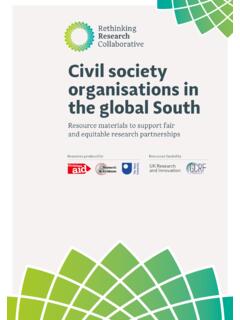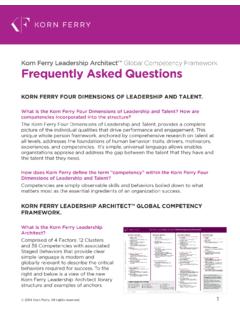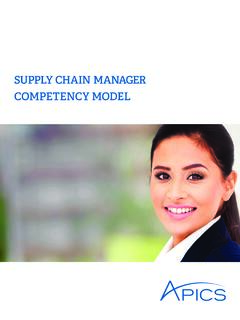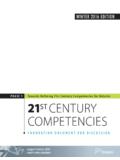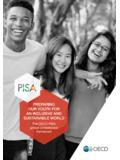Transcription of CHRISTIAN AID GLOBAL COMPETENCY MODEL
1 CHRISTIAN Aid COMPETENCY Framework Aug 2016 CHRISTIAN AID GLOBAL COMPETENCY MODEL CHRISTIAN Aid s GLOBAL COMPETENCY MODEL describes the main skills and abilities that everyone needs to demonstrate in order to perform effectively in their role at CHRISTIAN Aid. There are six core competencies and each COMPETENCY has five levels. 1. Build partnerships 2. Communicate effectively 3. Steward resources 4. Deliver results 5. Realise potential 6. Strive for improvement In addition to the above COMPETENCY framework, a standard set of skills and abilities have been introduced to support the embedding of agile working and digital enablement across the organization and are applicable to all COMPETENCY levels. Level One is the lowest level and indicates what every member of staff needs to demonstrate in their work with CHRISTIAN Aid.
2 Levels Two to Five build on the basic set of behaviours and they are linked to the different roles and responsibilities in the organisation. CHRISTIAN Aid COMPETENCY Framework Aug 2016 LEVEL 1: You are expected to be able to: Build partnerships Work in a collaborative way that develops positive relationships and proactively provide help to others Proactively participate in team work and contribute ideas, including those that may be beyond your own or your team s role. Keep others informed about what is going on in your own work area. Treat everyone with courteousness, dignity and respect, recognising that people are different and have different views. Act and behave consistently with what you Communicate effectively Communicate clearly and concisely, verbally and in writing.
3 Pass on messages or information promptly and accurately, ensuring clarity and understanding. Proactively question to clarify when needed. Explain things simply and in a different way if someone appears not to have understood. Be sensitive to and take responsibility for how your actions and words impact on others and adapt if necessary. Steward resources Be responsible for using resources economically, whether these are CHRISTIAN Aid resources or wider environmental resources. Recognise that time is a resource and take responsibility and proactive measures for managing your time effectively. Deliver results Agree your work plan and priorities, keep track of your own progress and keep others informed. Check the quality of your own work and deliver to expectations. Seek clarification and support from your manager when needed, ensuring appropriate sign-off.
4 Respond promptly to the requests of others, handling competing priorities and seeking guidance on these where appropriate. Consider the consequences of your actions, and take responsibility for the impact on your work, your colleagues and team objectives. Be accountable for your actions. Realise potential Acknowledge gaps in your own knowledge and skills and seek out information and advice in order to learn. Regularly ask for and act on feedback on own performance. Assist others by showing how to complete tasks and sharing knowledge. Strive for improvement Demonstrate openness and willingness to embrace change, be flexible and adapt to new methods of working. Respond quickly and positively to new initiatives. Find ways to make improvements in your work and ways of working.
5 Show initiative when faced with problems and proactively seek solutions. Willingly share knowledge and information that may help others. Digital enablement Being able to collaborate and work with colleagues who are not in the same physical place effectively, and build a sense of presence when working in a virtual team Understanding the principles of good design of digital content and able to develop digital content across a range of channels, such as social media, web and other digital media Having an hypothesis based approach to new ideas and being able to use data to drive decisions into the impact, adoption, engagement rates, success of those ideas. CHRISTIAN Aid COMPETENCY Framework Aug 2016 LEVEL 2: You are expected to be able to: Build partnerships Take on different work when necessary to achieve a team or organisational goal.
6 Actively consult with others to ensure you understand their needs or goals. Listen to and take on board fresh perspectives and views, even if you initially disagree with them. Maintain relationships with individuals and networks, based on mutual understanding and respect. Communicate effectively Make complex things simple for the benefit of others. Actively listen and question to check your understanding and draw out others when they are not expressing themselves clearly or seem to be holding back. Be sensitive to what others may be feeling, based on what they say, how they say it and their non-verbal behaviour, adapting your approach accordingly. Address difficult issues when they arise, being honest and open. Steward resources Implement ways to reduce inefficiency in use of resources or pass the ideas on to someone who can make them happen.
7 Estimate the resources needed to achieve your own work plans or objectives and deliver them in the most efficient and cost effective way. Set and communicate realistic timelines for achieving tasks, working out how best to adapt if priorities change or unforeseen circumstances arise. Deliver results Prioritise, plan and monitor your work to meet your own and team deliverables to agreed standards. Acknowledge others priorities whilst being prepared to say no if there are genuine reasons why their needs cannot be met. Use logical processes and relevant tools and techniques to report on information or analyse options. Make timely and considered recommendations or decisions based on analysis of available data, information and evidence. Realise potential Evaluate your own work and actively address gaps in knowledge and skills, without prompting.
8 Recognise how you react to feedback and manage reactions positively, acting on specific feedback from others. Share your knowledge where it will help others to be more effective. Provide instruction, constructive feedback and guidance to others to help them learn. Strive for improvement Constructively challenge existing practice. Seek better ways of doing things, taking into account the possible implications. Make positive suggestions on a way forward when faced with challenges, even if these fall outside the scope of your own work. Look inside and outside CHRISTIAN Aid for new ideas and evaluate their potential for your own work. Digital enablement Being able to collaborate and work with colleagues who are not in the same physical place effectively, and build a sense of presence when working in a virtual team Understanding the principles of good design of digital content and able to develop digital content across a range of channels, such as social media, web and other digital media Having an hypothesis based approach to new ideas and being able to use data to drive decisions into the impact, adoption, engagement rates, success of those ideas.
9 CHRISTIAN Aid COMPETENCY Framework Aug 2016 LEVEL 3: You are expected to be able to: Build partnerships Manage teams or lead projects supportively, involving others in discussing how to take work forward, helping people feel part of the team and treating everyone equally. Influence others to develop shared understanding and work cooperatively and collaboratively towards common goals where there are different personal or organisational agendas. Develop and maintain new relationships with individuals and organisations to further CHRISTIAN Aid s aims. Recognise and value differences in people; be ready to challenge assumptions, beliefs or attitudes in self or others. Manage expectations and adhere to what s agreed, by doing what you say you re going to do. Communicate effectively Reflect the needs of different audiences, adapting style, media, timing and pace to communicate effectively.
10 Show understanding of how personal and external factors affect others communication style and needs and seek to manage these differences to ensure that all voices are heard. Clarify expectations and anticipate others interests and potential issues, to help them get involved in debate and dialogue. Steward resources Accept accountability internally and externally for the effective use of CHRISTIAN Aid resources. Before using or commissioning new resources, look for ways to achieve more effective outcomes by using existing resources in a new or different way. Manage resources and workloads to ensure your own and others goals are achieved. Deliver results Create plans with key milestones and measurable outcomes: track progress and adjust to meet the objectives, ensuring others are aware of changes and reasons for them.
